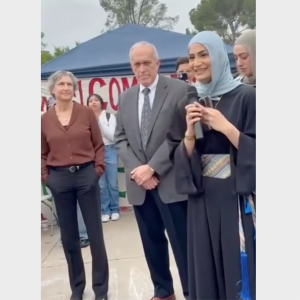 View Winners →
View Winners → 
A former Jurupa Unified School District teacher who alleges that she was dismissed because her religious beliefs formed the basis of her opposition to a district policy regarding withholding information from parents regarding children’s gender identity choices filed a civil rights lawsuit Wednesday.
“People of faith should be allowed to maintain their personal beliefs without fear of losing their job,” said Mariah Gondeiro, legal counsel for Murrieta-based Advocates for Faith and Freedom. “Jessica Tapia was not dismissed for any wrongdoing; rather, she was dismissed for her Christian beliefs. This is a clear violation of her constitutional rights.”
Tapia filed the federal civil rights action against the school district based on Title 7 of the 1964 Civil Rights Act, which prohibits religious viewpoint discrimination.
After Tapia’s dismissal in February, the school district released a statement in response to inquiries regarding the grounds for her termination, stating, “The district denies the allegations raised by Ms. Tapia. The district takes seriously its obligation to accommodate its employee’s religious beliefs. Simultaneously, the district is obligated to comply with all local, state and federal laws, including anti-discrimination laws and laws that protect students’ rights to privacy, which are in place to protect the nearly 2,500 employees and 18,000 students we serve.”
Tapia said in March that her dismissal was rooted in an interaction with administrators during which she and colleagues were instructed “to withhold information from parents” whenever they encountered a student who had begun identifying as a different gender.
“Right away, a major red flag popped up,” she said. “I said, ‘Are you asking me to lie?’ And they said, ‘Yes, it’s for students’ privacy.’ It was just so bizarre to me, because you’re talking about minors. The decision-making portal of their brain is not fully developed. They need their parents at this time for everything they’re going through. I can’t understand why the school system thinks that we ought to act as though we are the parents.”
Tapia said she specifically ran afoul a district policy linked to Assembly Bill 1266, which was signed into law in 2014. The bill focused on “pupil rights,” expanding on Section 221.5 of the California Education Code regarding students’ participation in courses.
The thrust of AB 1266 was that a “pupil shall be permitted to participate in sex-segregated school programs and activities, including athletic competitions, and use facilities consistent with his or her gender identity, irrespective of the gender listed on the pupil’s records.”
There were no explicit provisions written into the bill prohibiting educators from talking with parents about students’ gender choices. However, legal guidelines attached in a companion measure cited the California Public Records Act, Article 1, Section 1 of the state constitution and the federal Family Educational & Privacy Rights Act in establishing limits on what educators are permitted to disclose.
“Parents want to know everything happening with their child,” Tapia said in March. “They are trusting us to make sure their child is safe and taken care of.”
Gondeiro said schools “need more educators like Jessica, who grasp the fact that parents are partners and the final arbiters of their children, not obstacles to work around.”
“Jessica represents the values and integrity of educators across our country who are standing up for their beliefs, not backing down,” Gondeiro said. “We are proud to stand with Jessica and will continue to advocate for her and her values.”
Tapia said that her circumstances are not unique.
“My story is not just mine,” she said. “It is the story of every teacher of morals and faith. It is the story of every parent whose first priority is protecting their children.”
Assemblyman Bill Essayli, R-Norco, responded to Tapia’s dismissal by introducing AB 1314, which asserts the freedom of teachers to openly communicate with parents regarding their children’s gender transition decisions
“Public policy should never presume that a parent does not have the best interest for that child,” Essayli said in March. “Concealing information from parents is not only wrong; it’s dangerous and harmful to the safety of trans minors. Parents play a critical role in nurturing and supporting children, and they cannot be removed from the equation.”
Essayli’s bill seeks to reinforce in the California Education Code provisions already in place establishing a “parent’s right to know,” he said.
“Children are the domain of their parents, not the government,” Essayli said.











































































































